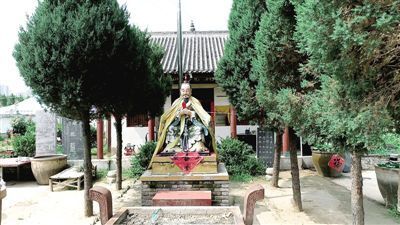'Mausoleum keeper' sticks to original aspirations to promote Liezi culture
- By Wang Zi
 0 Comment(s)
0 Comment(s) Print
Print E-mail China.org.cn, August 12, 2020
E-mail China.org.cn, August 12, 2020
A man has become a keeper of the mausoleum of his native ancient celebrity Liezi, thus inheriting his philosophy and intangible culture, Zhengzhou Evening News reported on Monday.

Chen Guoqin, 58, lives in a cemetery. Five meters from his living room, there is a tomb where Liezi has rested for thousands of years.
Liezi, who lived from approximately 450 to 375 BC and also known as Lie Yukou, was a native of Putian in the State of Zheng, now Dasunzhuang village in suburban Zhengzhou, capital city of central China's Henan province.
Liezi was an important thinker and iconic figure of Taoism after its founder Laozi. His classic book "Liezi" created many famous fables and lessons passed down through the ages. In 1999, Liezi was named "one of the top 10 historical celebrities in Zhengzhou."
Chen is a Dasunzhuang native. After finishing junior high school, he did not proceed further with his formal education but became a farmer. In 1994, he moved to the downtown area in Zhengzhou and settled down to make a living.
Still, his original village, and especially its most famous ancient resident, remained deep in his heart.
In 2008, Chen gave up an urban life and returned to his hometown, being elected the head of Dasunzhuang village and became the "mausoleum keeper" for Liezi.
During his tenure, he proposed to renovate the tomb of Liezi and promote the ancient age's culture. Chen's proposal was endorsed by the relevant provincial and municipal departments. In 2011, the "Legend of Liezi" was chosen as an intangible cultural heritage project of Henan province.
In 2014, Chen was named by local authorities as "representative inheritor" of the intangible cultural heritage related to Liezi.

After his term ended, Chen failed to get re-elected. However, his enthusiasm for Liezi has not diminished in the slightest. He spent his own money to organize activities. In a few years, he went through his savings and even got into owed debt. When this happened, his wife and other villagers began to complain.
Facing this situation, Chen remains true to his original aspiration and has been insisting on the inheritance and protection of Liezi culture. "Protecting and promoting Chinese traditional culture is what we Chinese people should do as the descendants of Liezi. Indeed, we are even more obliged to do so," said Chen.
Gradually, his hard work has received a more positive response, and the promotion of Liezi culture began to attract more attention.
In 2010, the local primary school was renamed Liezi Primary School; In 2013 and 2016, two educational institutes were successively established for children to study the ancient philosophy.
The Henan Yufeng Liezi Culture Research Institute was established in September 2015, aiming to strengthen the research and exploration of Liezi culture, so that the culture can survive and be passed down through generations. At present, the institute has registered more than 40 members.
In 2018, a series of cultural activities combining traditional culture and modern technology were held during the first China Zhengzhou Liezi Cultural Week.
Chen is currently planning to use a collection of antiquities to restore ancient life scenes, hoping to let people intuitively experience the essence of Liezi culture.
"I hope that more people can join the team to protect and inherit Liezi culture, and jointly carry forward it in future generations," he said.






Go to Forum >>0 Comment(s)